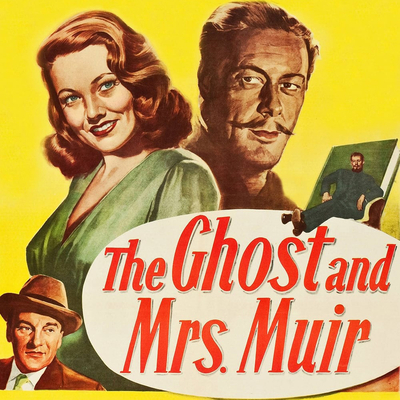The Ghost and Mrs. Muir was a hit when it was released in 1947, the tenth-biggest grossing film of that year, and it's hard not to see why. A romantic but not melodramatic story, it had just enough wry comedy to draw an audience of both men and women, and a veneer of literate quality that lands it square in that middlebrow sweet spot that once did a lot to broaden any film's appeal.
You can even go a step further and speculate that the romance at its centre, between a young widow and a recently deceased ghost, might have resonated with all the women who had lost loved ones during the war that had concluded just two years previous. There were, to be sure, a lot of ghosts wandering around America and the world at the time, in a miasma of shared grief that would take years to dissipate.
Just three years earlier the first modern ghost story picture was released with The Uninvited, the same year that tough cop Dana Andrews had fallen in love with a (presumably) dead woman in Laura. Mrs. Muir was played by the titular Laura, Gene Tierney, so the ground had been prepared for a movie about terror-free supernatural amour fou, set at the turn of the 20th century, which happened to be the era of choice for contemporary nostalgia, evoked in films as different as Meet Me in St. Louis, Life with Father, The Magnificent Ambersons and I Remember Mama.
Which is to say that The Ghost and Mrs. Muir is the sort of film that audiences would have settled into like a warm bath. The film's credits roll over Bernard Herrmann's ominous theme (he considered it his best score), hinting at spectral events to come over a shot of a rugged shoreline that is supposed to be Britain's southern coast (actually shot in Palos Verdes and Monterey, which accounts for the abundant Californian sunshine).
We meet our heroine not in Dorset but London, where the recently-widowed Mrs. Muir is living with her in-laws but trying to make an escape. Her mother-in-law (Isobel Elson) is a weepy, passive-aggressive monster, her sister-in-law (Victoria Horne) a more standard issue hard-faced harridan, and they think her decision to depart their stuffy townhouse is both willful and scandalous, especially as she'll be taking her young daughter Anna (Natalie Wood) and her housekeeper Martha (Edna Best).
She sets her sights on a cottage by the sea, and arranges to meet Coombe (Robert Coote), an estate agent in Whitecliff, who presents her with a choice of properties but tries to steer her away from Gull Cottage, the only one that suits her taste and income. It's been vacant for four years, after the apparent suicide of its builder and owner, a sea captain named Daniel Gregg (Rex Harrison).
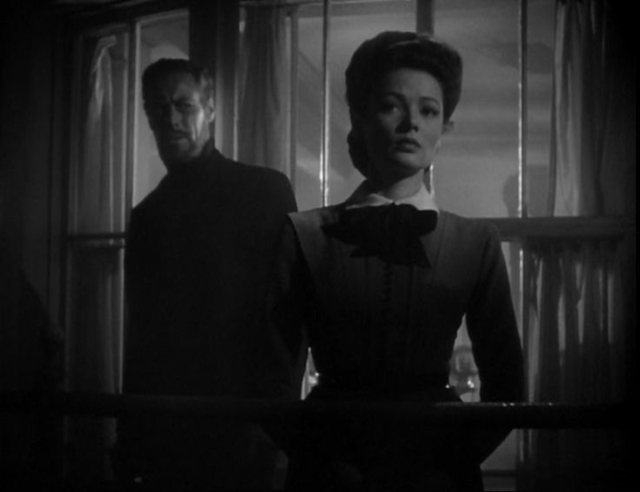
What he declines to tell her is that it's haunted by Gregg's ghost, though she discovers this soon enough, which only makes the place appeal all the more to her romantic nature. No sooner has she moved in with Anna and Martha than Gregg reveals himself to her, attempting to scare her away the same way he'd gotten rid of the previous tenants of Gull Cottage.
He denies that his death was a suicide: he accidentally kicked the spigot on the gas heater in his bedroom in his sleep, after closing the windows against the wind. There's a lot of business in the film with gas lamps and stoves, and it's fair to presume that much of its audience would have lived experience with the risks and peculiarities of heat and light in a pre-electric home.
Gregg wanted Gull Cottage to become a shelter for retired seamen and, dying without a will, his only hope of seeing this happen is to spook potential renters. But Lucy Muir refuses to be scared away, so they come to an agreement that he will appear only to her, sparing Anna and Martha, as long as she sleeps in his bedroom and continues to hang his portrait on its wall.
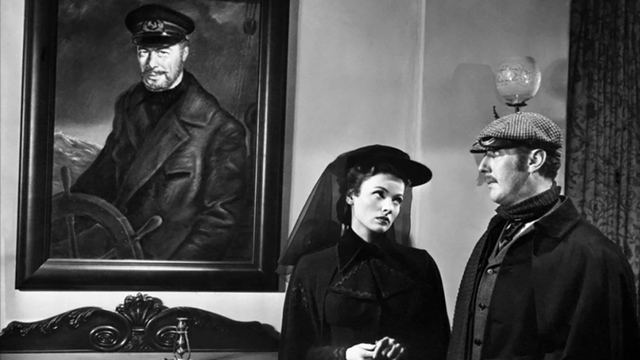
Tierney's Lucy Muir is a woman desperate for agency at a time when it's rarely granted, even to middle class gentlewomen such as herself. "I've never had a life of my own," she tells her in-laws, and when Coombe insists on choosing which property is appropriate, she digs in her heels and insists that "it's my mind."
Arguing with the ghostly Captain Gregg about what she thinks and how she's willing to accommodate his spectral tenancy at Gull Cottage, she's grateful when he disparages her for being stubborn: "Thank you – I've always wanted to be considered obstinate." And when he raises his voice at her she barks back that "everyone shouts at me and orders me about and I'm sick of it, you hear!"
Though suffragism isn't mentioned the trio of women who take up residence at Gull Cottage are a virtual bluestocking commune (though their perimeter is patrolled by Gregg, who is corporeal enough to shoo away her in-laws and Coombe when they try to invade the space). When Lucy breaks free of her in-laws while Martha and Anna listen through the pantry door, the maid declares that "it's a bloomin' revolution!"
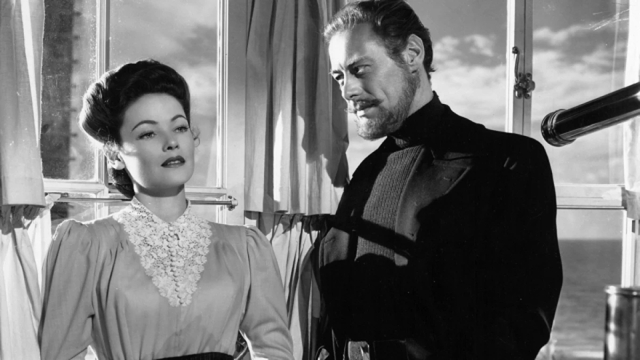
The Ghost and Mrs. Muir was directed by Joseph L. Mankiewicz during a crucial time in his career, which before it was over would include directing A Letter to Three Wives, All About Eve, Julius Caesar, Guys and Dolls, The Quiet American, Suddenly, Last Summer, Cleopatra and Sleuth. He was the younger brother of Herman Mankiewicz, a leading light in the New York literary scene until he was tempted by Hollywood – where Herman only intended to work long enough to pay off some debts. He would never leave, and while living notably large even for the movie industry he found time to write the script for Citizen Kane and guarantee his reputation for posterity.
Joe began his career in Hollywood at the dawn of talkies, when his brother got him a contract at Paramount. He started as a writer (Manhattan Melodrama was his first real triumph) before moving on to a more notable stint as a producer (Fury, The Shopworn Angel, The Philadelphia Story, Woman of the Year) until he got his first chance to direct with Dragonwyck, a 1944 melodrama he took on when his friend Ernst Lubitsch was sidelined by heart trouble. The opportunity came up when he was called on the carpet by Louis B. Mayer at MGM after getting romantically involved with Judy Garland, then one of Mayer's most prized properties.
Joe quit and negotiated a better deal with Joseph Schenck at 20th Century Fox, who wanted to showcase the prestige of his new signing by offering him more money and the chance to direct. Dragonwyck was hardly to his taste but he had to start somewhere and doing Lubitsch a favour didn't hurt. He followed this up with a film noir (Somewhere in the Night with John Hodiak), a rite of passage for nearly every director in the late '40s, and The Late George Apley, a romantic comedy starring Ronald Colman and Peggy Cummins.
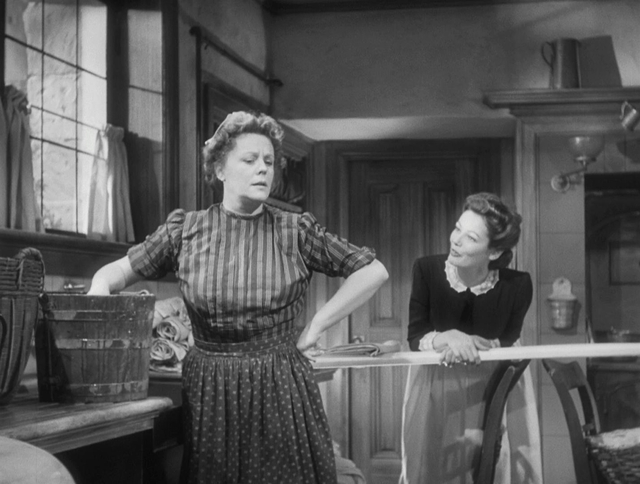
While his brother was famous for drinking and gambling, Joe was a philanderer who only appeared discreet in the context of Hollywood. He had an affair with Tierney when she was his female lead in Dragonwyck, and while married to his second wife, Rose Stradner, an actress who was struggling to restart her career. Mankiewicz tried to save the marriage by getting her a part in The Keys to the Kingdom (1944), a film he wrote for Fox, but it wasn't enough. Stradner died a suicide in 1958.
Tierney's own marriage to costume designer Oleg Cassini was also failing, and when it became clear to her that her director was only interested in an on-set fling, she transferred her affection to a frequent visitor to the film set, a young naval officer named John F. Kennedy. (While involved with Garland, Joe had to fit himself into her complicated romantic life, which at the time included her failing marriage to musician David Rose and affairs with Johnny Mercer and Tyrone Power.)
Joe Mankiewicz quickly developed a reputation as an actor's director. Writing about him in The Brothers Mankiewicz: Hope, Heartbreak and Hollywood Classics, Sydney Ladensohn Stern describes how he would whisper directions to actors "rather than publicly critiquing their work," and stopped yelling the customary "ACTION!" as the camera started rolling: "Reasoning that they could hear the camera whirring, he felt they had enough to deal with, and that once they became used to it, they liked the freedom."
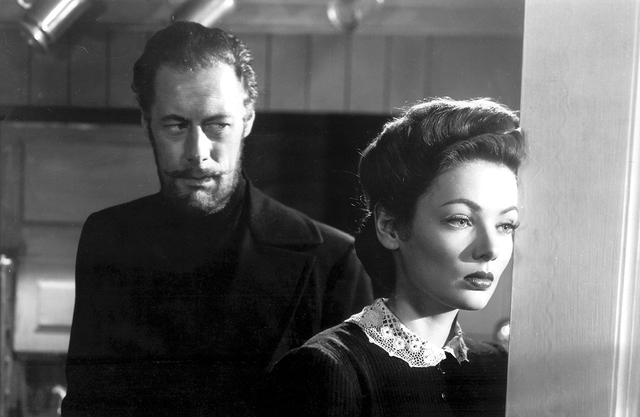
Tierney is underrated as an actress, then and now, and while Harrison's turn as the ghostly Captain was applauded by critics, no less than John Ford, who had worked with Tierney on Tobacco Road, wrote to praise the performance Mankiewicz got from her. Stern writes how Joe had written back to Ford, noting that he'd found an old diary entry "in which he had despaired of ever coming 'within even haling distance of you as a director.'"
Harrison, who was still in the early years of his Hollywood career, had a reputation for both a tempestuous emotional life and being difficult to handle on set. Mankiewicz, Stern recalled, "often described him as a Stradivarius, appreciated his dedication and talent, and they eventually made four pictures together." For his part, Harrison was "adept at handling Joe's dialogue-rich scripts."
The actor's charisma was his great strength, and he uses it to sell the romantic bond that slowly grows between the widow and the ghost, especially when he decides that the best way to overcome her sudden loss of income is to write his memoirs – a racy potboiler with the title Blood and Swash.
Racing against the threat of an eviction notice from Coombe, the pair frantically set about writing the book, and on the night they finish the last chapter it's clear to Gregg at least that they have worked themselves into an impossible emotional situation. But their first priority is finding a publisher, so Lucy sets off for London with the manuscript.

She arrives at the offices of Sproule (Whitford Kane), but before she can make it through the door she catches the eye of Miles Fairley (George Sanders), one of his authors. Rakish and louche, Miles writes children's novels under the pen name Uncle Neddy, and he lets her take his appointment with Sproule to pitch her book.
Sanders is great in what's essentially the thankless role of a cad who manages to woo Lucy over the objections of both Gregg and Martha. He could, of course, play this part in his sleep, but Sanders invests Miles with hints of real emotional need behind the veteran seducer.
You almost want him to succeed, which is crucial to the emotional pivot of the film – the scene where Gregg decides he has to leave Lucy to the hope of love and happiness in the real world, so he bids her farewell while she sleeps, planting the suggestion in her head that he had been nothing but a dream, and that she alone was the author of Blood and Swash.

Lucy is able to buy Gull Cottage with the advance from her book and is apparently set for life with income on sales. (It's sobering to imagine a time when this was considered plausible economics for a writer.) She's prepared Anna for the prospect of a new father, and has even forced Martha to mute her objections when she decides to pay a surprise visit to Miles at his London home after he cancels a visit to Whitecliff.
There's nothing really shocking about the plot twist that happens there; it's an old one and evergreen – there's one very nearly identical to it in the 2009 film Up in the Air, reviewed here just recently. And it isn't meant to be devastating for Lucy, who walks away to motherhood and economic security in her picturesque cottage by the sea.
And so the film circles back to the woman Tierney's Lucy was becoming at the start of the film – self-sufficient and unbothered by the demands of in-laws or suitors. She continues sleeping beneath the portrait of Captain Gregg, and watches as her daughter Anna and granddaughter Lucy grow up – both to marry captains, one in the navy and the other in the air force. (One imagines that both men, despite their rank, have conceded that they've married into an effective matriarchy.)
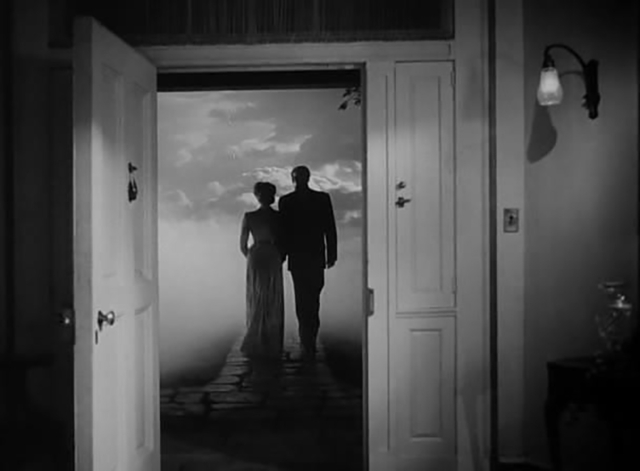
All the while Gregg's ghost lingers, just out of sight. The adult Anna (Vanessa Brown) reveals that he broke his promise to Lucy and appeared to the little girl, and that she had a great crush on her ghostly companion before he vanished, leaving her to conclude that he was just a particularly vivid invisible friend.
The ending reunites Gregg and Lucy, much as we imagined it must, at the moment of her death, walking down the stairs and out of the house, past the oblivious Martha and into the bright evening mist. This image of love beyond the grave must have resonated deeply in 1947, to those audiences full of widows, fiancées and girlfriends, left behind with just photos and letters – like my cousin who still talked about her airman beau, decades after his plane was shot down.
The film's popularity inspired a TV series twenty years later, starring Hope Lange as the widow and Edward Mulhare as the ghost. I remember it in syndication, playing in the afterschool hours between the game shows and soaps and the evening news, more a sitcom than a romance, with plots that seemed to me like dull adult copies of the ones on Scooby-Doo or The Funky Phantom.
Sean Connery was considered for a remake in the '90s but nothing obviously came of it. The Ghost and Mrs. Muir could still be remade today, and perhaps someone might understand the delicate appeal of the story, but I'm afraid that modern minds would be too tempted to reimagine the story of Lucy and Gregg as something macabre, or perverse. It's inevitable, really, in a society lucky enough not to be bonded together in vast, mutual grief.
Club members can let Rick know what they think by logging in and sharing in the comments below, as access to the comments section is one of many benefits that comes along with membership in the Mark Steyn Club.

